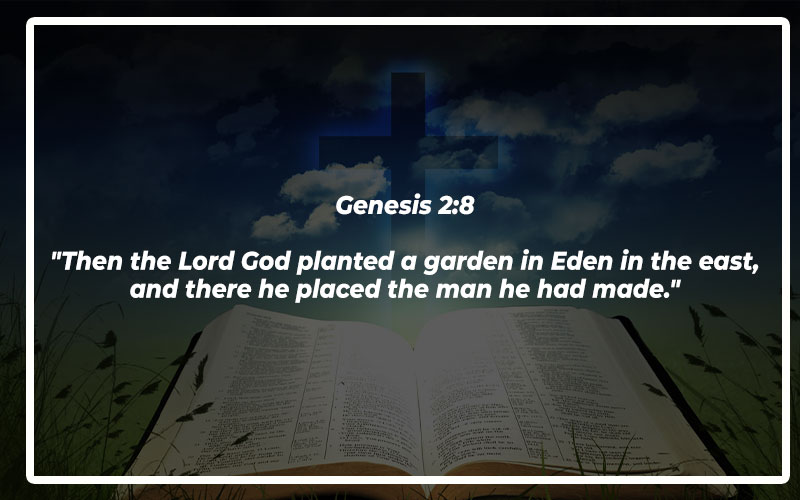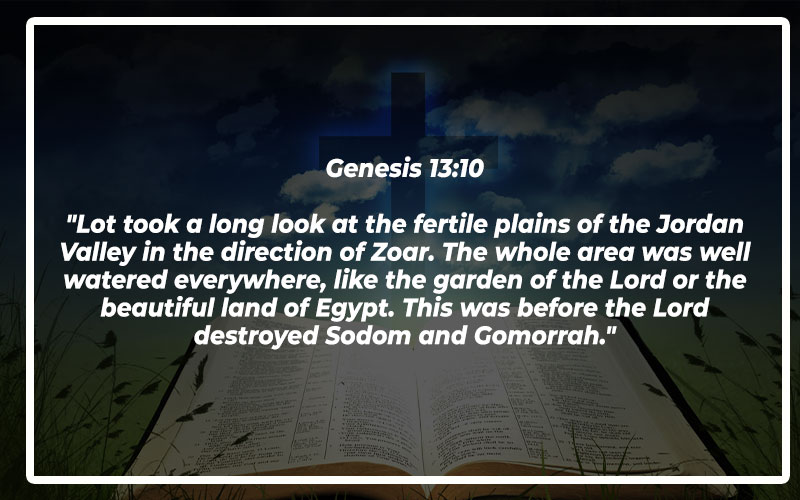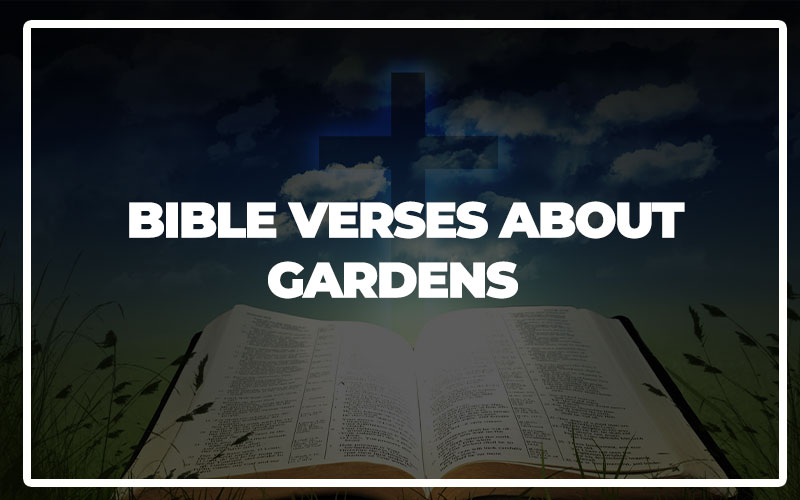The theme of gardens is significant in the Bible, symbolizing places of peace, abundance, and God’s presence. From the Garden of Eden to the Garden of Gethsemane, gardens have been the backdrop for some of the most important events in Scripture. In this exploration, we will look at verses that highlight the spiritual and physical significance of gardens throughout the Bible.
Also Read: Bible Verses About Nature Beauty
The Garden of Eden
The Garden of Eden is the starting point of humanity’s relationship with God. It is a place of perfection, abundance, and communion with God. However, it is also the site where sin enters the world, forever changing the human condition. These verses remind us of the original design and intention of God for His creation.
Genesis 2:8
“Then the Lord God planted a garden in Eden in the east, and there he placed the man he had made.”

This verse shows God as a careful Creator, planting a garden specifically for humanity. It highlights God’s provision, setting the stage for Adam and Eve to enjoy a life of peace and abundance in His presence.
Genesis 2:9
“The Lord God made all sorts of trees grow up from the ground—trees that were beautiful and that produced delicious fruit. In the middle of the garden he placed the tree of life and the tree of the knowledge of good and evil.”
Here we see the fullness of God’s creation, not only beautiful to the eye but also useful for sustaining life. The placement of the tree of life and the tree of knowledge speaks to the divine intention for humans to choose obedience in relationship with God.
Genesis 3:23
“So the Lord God banished them from the Garden of Eden, and he sent Adam out to cultivate the ground from which he had been made.”
After the fall of Adam and Eve, this verse shows the consequences of disobedience. The garden, once a place of peace, becomes a lost paradise. It represents the separation between humanity and God due to sin.
Genesis 2:15
“The Lord God placed the man in the Garden of Eden to tend and watch over it.”
This verse emphasizes humanity’s role as stewards of God’s creation. Adam’s responsibility to tend the garden highlights a partnership with God in caring for His creation.
Genesis 3:24
“After sending them out, the Lord God stationed mighty cherubim to the east of the Garden of Eden. And he placed a flaming sword that flashed back and forth to guard the way to the tree of life.”
The expulsion from Eden signifies the loss of direct access to God. Cherubim and the flaming sword emphasize the seriousness of sin and the protection of sacred things from a now-fallen humanity.
Gardens of Rest and Peace
In the Bible, gardens are also symbolic of rest and peace. Often, they are depicted as places where people can commune with God and find solace. The following verses show gardens as a haven, a space to reflect on God’s goodness and provision.
Song of Solomon 6:2
“My lover has gone down to his garden, to his spice beds, to browse in the gardens and gather the lilies.”
This verse speaks of intimacy and love, using the garden as a metaphor for a place of meeting and communion. It reflects how gardens can symbolize deep relationships, whether between people or with God.
Isaiah 58:11
“The Lord will guide you continually, giving you water when you are dry and restoring your strength. You will be like a well-watered garden, like an ever-flowing spring.”
This imagery of a well-watered garden signifies God’s provision and restoration. Even in times of dryness and difficulty, God promises to refresh and sustain those who trust in Him.
Jeremiah 31:12
“They will come home and sing songs of joy on the heights of Jerusalem. They will be radiant because of the Lord’s good gifts—the abundant crops of grain, new wine, and olive oil, and the healthy flocks and herds. Their life will be like a watered garden, and all their sorrows will be gone.”
This verse uses the garden as a metaphor for blessing and abundance. God’s people will experience peace and joy, like a garden that is well cared for and flourishing, symbolizing restoration and hope.
Isaiah 61:11
“The Sovereign Lord will show his justice to the nations of the world. Everyone will praise him! His righteousness will be like a garden in early spring, with plants springing up everywhere.”
The garden imagery in this verse represents the flourishing of righteousness and justice. Just as plants spring forth in their season, so will God’s justice prevail across the earth, bringing renewal and hope.
Psalm 1:3
“They are like trees planted along the riverbank, bearing fruit each season. Their leaves never wither, and they prosper in all they do.”
This verse highlights the blessings of those who walk in God’s ways. Like trees planted near a source of water, they will always be sustained and fruitful, reflecting a life lived in connection with God.
The Garden of Gethsemane
In the New Testament, the Garden of Gethsemane is a place of deep prayer and surrender. It is where Jesus wrestles with the Father’s will before His crucifixion. This garden is a symbol of sacrifice, obedience, and preparation for suffering.
Matthew 26:36
“Then Jesus went with them to the olive grove called Gethsemane, and he said, ‘Sit here while I go over there to pray.'”
This moment marks the beginning of Jesus’ intense prayer and agony before His arrest. The Garden of Gethsemane becomes a place of spiritual struggle and surrender, highlighting Jesus’ obedience to the Father’s will.
Luke 22:44
“He prayed more fervently, and he was in such agony of spirit that his sweat fell to the ground like great drops of blood.”
This verse emphasizes the depth of Jesus’ suffering in the garden. His physical agony reflects the immense emotional and spiritual burden He carried as He prepared to face the cross, underscoring His sacrifice for humanity.
Mark 14:32
“They went to the olive grove called Gethsemane, and Jesus said, ‘Sit here while I go and pray.'”
In the Garden of Gethsemane, Jesus invites His disciples to pray with Him, though He must ultimately face His trial alone. This verse demonstrates the importance of prayer in moments of intense trial and decision.
Matthew 26:39
“He went on a little farther and bowed with his face to the ground, praying, ‘My Father! If it is possible, let this cup of suffering be taken away from me. Yet I want your will to be done, not mine.'”
Here we see the heart of Jesus’ prayer—His willingness to submit to God’s will even in the face of unimaginable suffering. It is a model of surrender, showing us how to trust God in our most difficult moments.
John 18:1
“After saying these things, Jesus crossed the Kidron Valley with his disciples and entered a grove of olive trees.”
Jesus’ journey into the garden sets the stage for His arrest and crucifixion. The garden becomes a symbol of His coming sacrifice, and His time there represents the transition from His earthly ministry to the fulfillment of His purpose on the cross.
Also Read: Bible Verses About Gardening
Gardens as Places of Renewal
Throughout the Bible, gardens are associated with renewal, growth, and restoration. They often represent God’s work of renewal in the lives of His people, bringing spiritual refreshment and new beginnings. The following verses explore the theme of renewal through the metaphor of gardens, illustrating how God restores life, faith, and hope.
Isaiah 51:3
“The Lord will comfort Israel again and have pity on her ruins. Her desert will blossom like Eden, her barren wilderness like the garden of the Lord. Joy and gladness will be found there. Songs of thanksgiving will fill the air.”
This verse speaks of God’s promise to restore His people, transforming desolation into a flourishing garden. It paints a picture of renewal where barren places are made fruitful, bringing joy and gladness through God’s redemptive work.
Ezekiel 36:35
“And when I bring you back, people will say, ‘This former wasteland is now like the Garden of Eden! The abandoned and ruined cities now have strong walls and are filled with people.’”
Here, God promises to restore Israel, likening it to the Garden of Eden. The transformation of wasteland into a thriving garden symbolizes God’s power to bring life out of desolation, reminding us that no situation is beyond His ability to renew and restore.
Isaiah 61:3
“To all who mourn in Israel, he will give a crown of beauty for ashes, a joyous blessing instead of mourning, festive praise instead of despair. In their righteousness, they will be like great oaks that the Lord has planted for his own glory.”
This verse draws on garden imagery to convey the idea of renewal. God’s people are compared to great oaks, planted for His glory, signifying stability, strength, and new life. This transformation from mourning to joy shows how God restores and renews His people.
Amos 9:14
“I will bring my exiled people of Israel back from distant lands, and they will rebuild their ruined cities and live in them again. They will plant vineyards and gardens; they will eat their crops and drink their wine.”
This verse depicts a time of restoration and renewal, where the people of Israel return from exile and rebuild their lives. The planting of vineyards and gardens symbolizes the return of peace, stability, and God’s blessing, reflecting a new chapter in their relationship with Him.
John 15:1
“I am the true grapevine, and my Father is the gardener.”
In this verse, Jesus describes His relationship with God and His followers using the metaphor of a garden. God is the gardener, and Jesus is the vine, highlighting the continuous work of pruning, growing, and nurturing that leads to fruitful lives in Christ.
Gardens as Symbols of God’s Blessing
Gardens in Scripture are often portrayed as symbols of God’s blessing and abundance. They represent God’s provision, care, and generosity toward His people. These verses demonstrate how God’s blessings are like a garden—overflowing with life, sustenance, and joy.
Genesis 13:10
“Lot took a long look at the fertile plains of the Jordan Valley in the direction of Zoar. The whole area was well watered everywhere, like the garden of the Lord or the beautiful land of Egypt. This was before the Lord destroyed Sodom and Gomorrah.”

This verse describes the Jordan Valley as being lush and well-watered, reminiscent of the Garden of Eden. It illustrates the richness and beauty of the land, symbolizing God’s blessing upon creation and His ability to provide abundantly for His people.
Isaiah 65:21
“In those days people will live in the houses they build and eat the fruit of their own vineyards.”
This verse highlights God’s blessings of stability and prosperity. The image of planting vineyards and enjoying their fruit emphasizes the rewards of faithful living and God’s provision for His people, portraying the garden as a symbol of divine abundance.
Deuteronomy 11:10-11
“For the land you are about to enter and take over is not like the land of Egypt from which you came, where you planted your seed and made irrigation ditches with your foot as in a vegetable garden. Rather, the land you will soon take over is a land of hills and valleys with plenty of rain.”
This passage contrasts Egypt’s labor-intensive irrigation with the promised land, where God’s blessing is evident in the land’s natural abundance. It highlights the ease with which God’s people will enjoy the fruits of the promised land, reflecting His gracious provision.
Psalm 107:35
“But he also turns deserts into pools of water, the dry land into springs of water.”
This verse underscores God’s power to bring life and blessings even in desolate places. The transformation of deserts into springs of water symbolizes God’s ability to bring renewal, provision, and abundance where there once was none, emphasizing His care and blessings for His people.
Psalm 128:2-3
“You will enjoy the fruit of your labor. How joyful and prosperous you will be! Your wife will be like a fruitful grapevine, flourishing within your home. Your children will be like vigorous young olive trees as they sit around your table.”
This psalm is a beautiful picture of God’s blessing upon a faithful family. The fruitful grapevine and olive trees symbolize prosperity, joy, and family unity, showing how God’s blessings touch every area of life, like a flourishing garden filled with life and abundance.
The Future Garden in Revelation
The Bible concludes with the imagery of a future garden in the new heavens and new earth. This garden symbolizes the ultimate restoration of all things, where God will dwell with His people in perfect harmony and peace. These verses from Revelation give us a glimpse of the eternal paradise that awaits those who trust in the Lord.
Revelation 22:1-2
“Then the angel showed me a river with the water of life, clear as crystal, flowing from the throne of God and of the Lamb. It flowed down the center of the main street. On each side of the river grew a tree of life, bearing twelve crops of fruit, with a fresh crop each month. The leaves were used for medicine to heal the nations.”
This passage describes the future garden in the New Jerusalem, where the tree of life reappears, symbolizing eternal life and healing. The river of life flowing from God’s throne signifies the source of all life and blessing, painting a beautiful picture of the eternal peace and provision we will experience in God’s presence.
Revelation 2:7
“Anyone with ears to hear must listen to the Spirit and understand what he is saying to the churches. To everyone who is victorious I will give fruit from the tree of life in the paradise of God.”
Jesus’ promise to the victorious believers includes access to the tree of life, which is a symbol of eternal life. The “paradise of God” refers to the ultimate restoration and perfection of the world, where believers will live in God’s presence forever, enjoying the fullness of His blessings.
Revelation 22:14
“Blessed are those who wash their robes. They will be permitted to enter through the gates of the city and eat the fruit from the tree of life.”
Those who have been purified by Christ are promised access to the tree of life. This verse highlights the eternal reward for those who follow Jesus, symbolizing the complete restoration of what was lost in the Garden of Eden. It offers hope of eternal life in the renewed creation.
Revelation 22:3
“No longer will there be a curse upon anything. For the throne of God and of the Lamb will be there, and his servants will worship him.”
This verse proclaims the removal of the curse that entered the world through sin in the Garden of Eden. In the new creation, the curse is undone, and God’s people will worship Him in a perfect, restored paradise, free from suffering and death.
Revelation 22:5
“And there will be no night there—no need for lamps or sun—for the Lord God will shine on them. And they will reign forever and ever.”
This verse paints a picture of the eternal reign of God’s people in the new heavens and new earth. The absence of night symbolizes the end of darkness and evil, while God’s eternal light provides life and guidance, making the future garden a place of eternal joy and communion with God.
Also Read: Bible Verses About Leaves
What Does the Bible Say About Gardens
The Bible speaks about gardens in many special ways, showing that they are important places. In the Bible, gardens are not just areas of land with plants and trees, but they are often places where people meet with God, experience His blessings, or even face challenges.
In the very beginning of the Bible, God creates a beautiful garden. It is full of life, with every kind of tree that produces good food. This garden is where the first man and woman live. They walk in this peaceful place, and it is where they have a close relationship with God. The garden represents a perfect world, full of beauty and peace.
However, the Bible also tells stories of other gardens that are not always peaceful. In one garden, people face hard choices that lead to consequences. The garden, which started as a place of peace, becomes a place where people feel sorrow because of their wrong decisions. Gardens, in this way, show how life can change depending on the choices people make.
Later in the Bible, gardens continue to appear in different stories. Sometimes they are places of rest, where people can relax and enjoy the beauty of nature. Gardens are also places of hard work, where people grow food and take care of the land. This shows that gardens are both gifts from God and places where people must work and care for what they have.
In some parts of the Bible, gardens are mentioned as places of hope. Beautiful, flourishing gardens are a sign of God’s blessings and His promise to make things right. When people think of gardens in the Bible, they often think of peace, provision, and hope for the future.
Overall, the Bible uses gardens to teach important lessons about life, showing them as places where God provides, people work, and where both joy and challenges can happen. Gardens remind us of the beauty of creation and the relationship between God and humanity.

